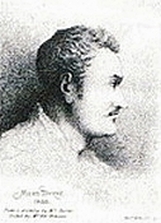- CLAN O'BYRNE HOME PAGE
- New Page
- NEW!! UNCOVER YOUR PAST ! !
- CLAN O'BYRNE EVENTS ARCHIVE
- Who do YOU think you are ? The Clan O'Byrne DNA Project
- FORUMs
- BYRNE HERALDRY
- Clan O'Byrne Gathering Rally Poll
- The Gathering Rally Quick Guide
- News , Updates and Archives
- Clan O'Byrne Background
- The Clans of Ireland
- Histories of the O'Byrnes
-
Sept families of the Leinster Byrnes
- Leinster Clans Alliance
-
Clan Rallies of the O'Byrnes
- St. Geri 2008
- Well known and not so well known Byrnes
- Ancestors sought and hoped for.
- Blogs for Byrnes
- Clan O'Byrne Video Vault
- Publications, Links and Sources
- Irish Order of Knighthood
- Google Wicklow
- Drives thro County Wicklow
- Membership registration form
- Clan Ó Byrne Members only
The History of Clan O'Byrne
THE REBELLION OF 1798 IN THE O'BYRNES COUNTRY
Miles Byme of Monaseed 1780 - 1862.
Chef-de-Bataillon in the service of France and ofiicer of the Legion of Honour, he was born 20th March I780 at Monaseed, Co. Wexford. As a youth he entered into the hopes and plans of the United lrishmen. On 3rd June 1798 he joined the insurgents under Fr. John Murphy encamped at Corrigrua, Co.Wexford. Next moming this force consisting of of about l0,000 men armed chiefly with pikes, without artillery and with few muskets marched on Gorey. They were opposed by troops under Colonel Walpole who was killed in a skirmish, when his force was routed and his three pieces of artillery with ammunition were seized. Gorey was then occupied and fresh insurgents flocked in from everywhere.
On 7th June Carnew was taken and bumed and a hill close by was occupied as a camp. Next day Carnew was evacuated and preparations were made for an attack on Arklow which was garrisoned in force by the military. The battle was hotly contested but eventually the insurgents had to withdraw having suffered fearful losses. Fr. Michael Murphy, one of their bravest heros was killed. Several days were spent in aimless marches, the want of an efficient commander
in chief being greatly felt. Provisions and ammunition were growing scarce, and the insurgent army attended by crowds of followers was further encumbered by the numbers of wounded, whose sufferings they could not properly alleviate but whom they dared not leave behind to the mercy of the soldiers and yeomanry. An attack on Bunclody failed and the southem division of the insurgents was defeated with terrible slaughter at New Ross. The scattered bands, weakened
by death, disease and exposure gradually concentrated on Vinegar Hill, near Enniscorthy, there on 2lst June they made their last stand, and in it Miles Byrne played a distinguished part. Attacked at dawn by overwhelming columns of troops under General Lake they fought with the fury of despair but before long they were defeated. They broke down the hill through an opening left by their opponent in his columns. Byrne pays tribute to the bravery of the insurgents. Wexford was occupied by the military next day when the executions and transportations began. Byrne kept command of a small force. Marching over the old battleground of Foulksmill they turned north through Killane. On the 23rd June they attacked Goresbridge and were joined by a party of colliers from Castlecomer. Here he had to deplore the murder of several prisoners in cold blood by his men in revenge for the picketing, pitch-caps, and executions to which the people had
been exposed before hostilities began.
Castlecomer was attacked with some success. On 26th June the now dimished band of pikemen retumed into Wexford through the Scollagh Gap. With his wounded brother he paid a furtive visit to his mother and sister. Alter a few skirmishes with the troops he joined Michael Dwyer and General Holt in the glens of Wicklow. ln Glenmalure he met a large number of Wexford men and with them carried on resistance for some months.
On 10th November he escaped into Dublin disguised as a car driver. He passed a few years as a clerk in a timber yard. ln the winter of 1802-3 he was introduced to Robert Emmett. Following the example of many insurgents in Dublin he entered with enthusiasm into his plans. Byme made contracts for arms with gunsmiths and prepared pike handles. When the eventful 23rd July arrived, Byrnes task was to command a body of men on the Coal, now Wellington Quay.
Like all Emmett's plans this miscarried. Byme, it seems was ready with his contingent but the first news that reached him was of a fracas in Thomas St., and Emmett’s flight to Rathfarnham. Two days later he had an interview with Emmett; it was arranged that Byrne would go toParis and try to procure help from the French Govemment. ln an American vessel he escaped Dublin to Bordeaux. From there he went to Paris where he was quickly in communication with the refugees there. But all hopes of French aid were gone. Entering the French army he served
with distinction in Spain, the Low Countries and Germany. l-le continued in the army after the Restoration and in 1830 he was appointed chef-de-Bataillon. His memoirs, edited by his wife, though lacking in arrangment are full of interesting particulars of the varied scenes he passed through, and abound in biographical details of the Irish exiles in France. His love of fi'eedom and the well-being of his fellow man was confined to no country or race. To the last his love of lreland and interest in her progress continued unabated. A singularly noble looking man, erect and soldier-like to the end, with all of the polish of a perfect gentlman, genial in manner he was full of anecdotes of the various phases of his eventful life.
Design and Graphics by Val Byrne. Copyright © 2013 Val Byrne. All rights reserved.
